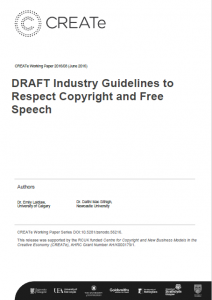 CREATe is delighted to announce a new working paper authored by Emily Laidlaw, University of Calgary and Daithí Mac Síthigh, Newcastle University. The working paper provides guidelines for copyright owners and intermediaries for respecting the right to freedom of expression as it relates to copyrighted works.
CREATe is delighted to announce a new working paper authored by Emily Laidlaw, University of Calgary and Daithí Mac Síthigh, Newcastle University. The working paper provides guidelines for copyright owners and intermediaries for respecting the right to freedom of expression as it relates to copyrighted works.
Post by Dr. Emily Laidlaw, University of Calgary.
We are pleased to publish draft guidelines for copyright owners and intermediaries for respecting the right to freedom of expression as it relates to copyrighted works. The relationship between copyright law and freedom of expression has always been controversial, but this tension has deepened in recent years with the rapid growth in prominence of digital technologies (e.g. online access to creative works) and the extension of copyright law (e.g. longer terms, control over end user activities). Businesses and intermediaries come under increasing pressure, in public debate, to assess the balance between free speech and other rights, such as copyright and freedom to conduct business. This has consequences for reputation, consumer loyalty, and marketing strategies. Meanwhile, cultural norms concerning the use of copyrighted works continue to evolve; take for example the popularity of mash-ups, sampling, and forms of social commentary (parodies, satire etc.). Digitisation eases distribution, but also makes perfect copying much more feasible. This has muddied already uncertain waters concerning the boundary between copyright and freedom of expression, on which CREATe has published an extensive academic literature review.
These guidelines seek to distil principles of good practice for copyright owners and intermediaries to identify when a free expression right is implicated in the design, use, or enforcement of copyright. It is hoped that these guidelines can be used to clarify the contours of a copyright owner’s rights, and in particular to internalise and harmonise the impact of decisions regarding the use of works on the exercise of speech rights.
The guidelines, at this stage, are a draft. We invite crowd-sourced feedback on how these guidelines should evolve. This is because our goal is to continue to work on guidelines for industry, not only this more generalised set of principles, but industry-specific and use- specific guidelines in the future. We currently propose to produce guidelines in the areas of fan fiction, user generated content and intermediaries.
We would like to thank the participants in our workshop held in London, United Kingdom in April 2016 for their insights as well as our host, the Information Law and Policy Centre at the Institute of Advanced Legal Studies and funder, CREATe, the RCUK-funded Centre for Copyright and New Business Models in the Creative Economy.
